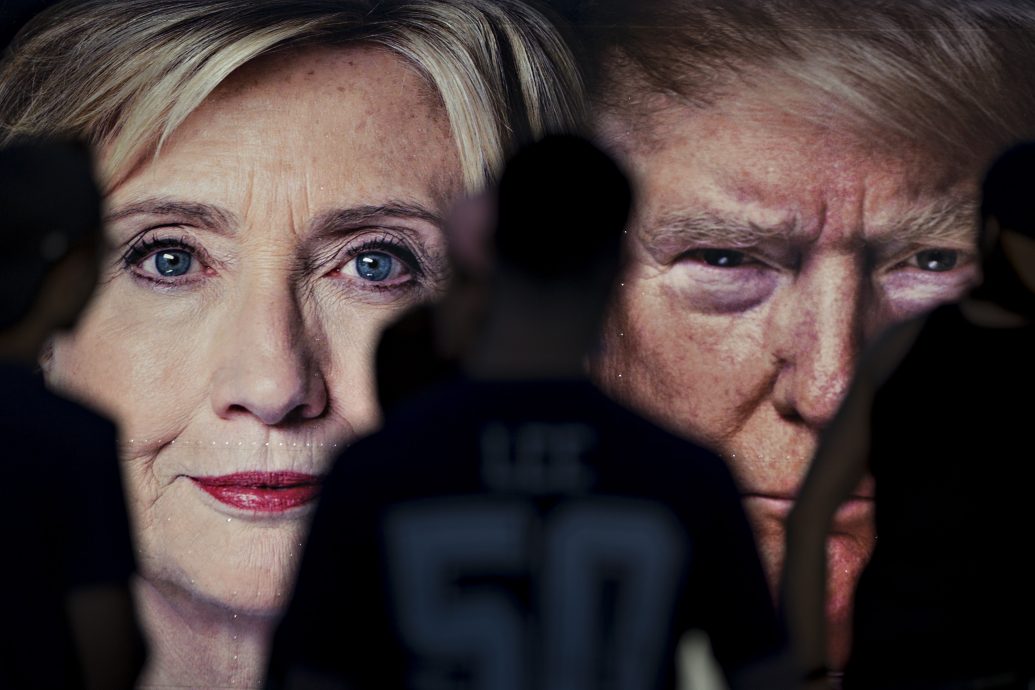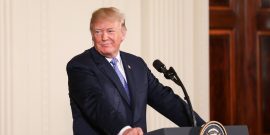What Do These Two Think About the Office to Which They Aspire?
Presidential debates neither are nor ought to be midterm exams. The people who administer midterms do not necessarily possess political wisdom (see “Wilson, Woodrow”), and the people who excel at taking them may be better at demonstrating technical detail than prudential judgment (see above). Thus questions that make a candidate stumble—and that can win the journalistic brass ring for the moderator, namely, instigating news—tend not to be as valuable as those that prompt reflection and reveal a mind at work.
On the other hand, sometimes stumbling and revelation coincide. They might just, if NBC’s Lester Holt were to pose questions tonight that required constitutional and not merely policy reflection. Herewith—amid a campaign notable for its utter lack of constitutional conversation—a few suggestions.
- Article II of the Constitution vests “the executive power” in the President. What does the “executive power” include?
The executive authority has been variously held to “presuppose the existence of the laws to be executed,” and thus to be derived from the legislative power, or, at the other extreme, to include “the plenary authority . . . to use military force abroad.” The truth almost surely lies somewhere in between, but it has been edging, if not hurtling, toward the plenary end—and not just on the foreign but on the domestic front as well. A President should have a view not merely of policy but of the presidency. Bonus points are awarded for modesty. Speaking of which:
- Could you name something you would like to do as President—that you think would be good for the country—that you would not do because Presidents lack the authority to do it?
Asked to explain why he refused to answer the Senate’s call, Shakespeare’s Caesar answered, “The cause is in my will.” Will is increasingly the criterion of presidential authority. The office is viewed as a vehicle for pursuing the public good, constitutional niceties such as the separation of powers notwithstanding.
These niceties matter for myriad reasons, one of which is that the diversity of Congress registers the richness of public views. Anyone in the mainstream of American politics can more or less find his or her views represented in Congress taken as a whole. By contrast, one who does not vote for the President is wholly on the outs for four years. Moreover, Congress operates at an inherently deliberate pace, whereas the presidency is more prone to impulsive, imperious decisions.
So do the candidates agree with James Madison that combining the legislative and the executive functions would be “the very definition of tyranny,” or do they concur with the emerging vision of the presidency as a channel for the general will as the President conceives it?
- Could you name a bill you think would be good for the country that you would nonetheless veto because it exceeds the enumerated powers of Congress?
Madison could. On his last full day in office, he vetoed an internal improvements bill he supported on policy grounds because he objected to it constitutionally. Now, though, perceptions of the public good have barreled over both constitutional process and local variety, which is supposed to be protected by the division of authority between national and state governments.
William Voegeli has noted the difference between saying government should be big or small and saying it should be limited or unlimited. Similarly, to observe that Congress’ powers are enumerated is not to say they are to be construed parsimoniously. These powers can be viewed capaciously or narrowly. The key question is whether the candidates view the federal government as having specified powers or plenary powers: that is, whether they view it has having limited or unlimited powers.
- Could you name an issue on which your constitutional and policy preferences diverge?
The holy grail of constitutional sincerity is a candidate who, on policy grounds, may want the Supreme Court to do one thing but who recognizes the need for it to do another out of respect for the Constitution. Such a candidate might, for example, favor same-sex marriage but oppose Obergefell. Such a candidate would be committed to constitutional self-government. Such a candidate would not be a constitutional opportunist. Such a candidate is not, to date, extant.
- Will you expect members of your political party in Congress to be loyal to your agenda or to their branch of government?
The party system has eroded—make that “trampled”—the separation of powers by establishing links of loyalty between the branches where competition was supposed to take place. The Democratic member of Congress who stands up for the institution against the incursions of a Democratic President, or the Republican who does the same, is vanishingly rare. (Democratic Senator Tim Kaine of Virginia is an exception; whether he would stay one if he entered the executive branch as Vice President remains to be seen.)
- Should the President faithfully execute the laws when he or she disagrees with them? Under what circumstances should a President decline to execute a law?
Article II calls on the President to execute the laws faithfully. To refuse out of a conviction that a law is unconstitutional may be one protection for the separation of powers and, arguably, for constitutional liberty. But refusal is not, at a minimum, supposed to be a tool of policymaking convenience. It has become one. Would the candidates vow to limit such refusals to enforce the law to extraordinary instances—those in which they hold a constitutional objection—or are more DACAs in our future?
- Should the President give force to a Supreme Court decision with which he or she disagrees? Under what circumstances should he or she decline to?
The regnant constitutional morality is one of presidential subservience to the Supreme Court. Yet Federalist 78 says one reason not to worry about an abusive court is that it will need executive enforcement to impose its rulings; clearly Publius contemplated scenarios in which such enforcement would not occur. This entails the virtue of prudence, particularly the dimension of it that can distinguish the ordinary from the extraordinary. How would the one be distinguished from the other?
- Under what circumstances do you think you would need a declaration of war from Congress in order to pursue a military strategy?
Congress’ authority to declare war is surely triggered somewhere on the murky spectrum between the Tripoli pirates and the invasion of Iraq. Where? Do you view yourself as “the decider” on such issues or do you agree with Madison that it would be a conflict of interest for Presidents who acquire the glory of war also to possess the authority to start it?
- One of the men you hope to succeed, Abraham Lincoln, said the greatest danger to American liberty would be the pursuit of glory in times that did not require it. Do we live in times that require presidential glory? If so, what is the role of the President today? If not, how would you accommodate yourself to a modest role for the office?
It is the unique conceit of Presidents, surrounded by the accoutrements of power, always to assume the largeness of the moments they stand astride. Citizens sometimes suffer from a similar inflation of historical importance. The news media, who neither sell papers nor attract viewers by putting matters in perspective, inflame the dynamic. Most historians, meanwhile, rate Presidents according to the speed at which they achieved change, not whether they calibrated the change to need.
It so happens that some moments are not large, but ordinary. Many fall somewhere between crisis and calm. How would the candidates rate our historical moment, and their role in it? (Hint: Donald Trump and Hillary Clinton have shown a proclivity for the first-person singular that is remarkable even by the standards of the contemporary presidency.)
- Historians often rate as successful those Presidents who preserved or augmented the authority of the office. Can you think of any ways that presidential authority should in fact be cut back?
The office of Chief Executive is swollen beyond all constitutional proportions. Comes now Donald Trump, who acknowledges its growth but promises to put executive orders to better use. “I won’t refuse it. I’m going to do a lot of things,” he said. “But I’m going to use them much better and they’re going to serve a much better purpose than [Barack Obama’s] done.” And this: “You know, the great thing about executive orders is that I don’t have to go back to Congress.” Similarly, Hillary Clinton says that “if Congress won’t act,” she will “ask the Treasury Department” to close corporate tax loopholes. She also pledges to restrict access to guns executively if necessary: “I want to work with Congress, but I will look at ways as President.”
Are there any respects in which they want the office to get smaller? That is perhaps a rhetorical question. If so, it would in itself be the most revealing—and depressing—of the lot.



